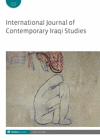- Home
- A-Z Publications
- International Journal of Contemporary Iraqi Studies
- Previous Issues
- Volume 9, Issue 1, 2015
International Journal of Contemporary Iraqi Studies - Volume 9, Issue 1, 2015
Volume 9, Issue 1, 2015
-
-
Editing out the architectural history of modern Iraq: Aspects of the academic discourse (1950s–1980s)
More LessAbstractIn 1988, Jabra Ibrahim Jabra, the famous Palestinian Iraqi writer, published an article in an Iraqi magazine, in English, the title of which was ‘Baghdad in a perspective of time’. Jabra’s text praised Babylon, not Baghdad, as ‘the outward-oriented city of pluralities, capable of holding together in a viable and dynamic form a vast number of disparate elements, both human and cultural. Different races, religions, languages, all living together […]’. Perhaps it would have been difficult to express nostalgia for cosmopolitan Iraq’s multiple heritages under the leadership of Saddam Husayn, a period in which Baghdad was made selective use of as an embodiment of certain historical landmarks to the detriment of others. This article assesses some aspects of the architectural critical discourse in Iraq starting with the 1950s, a decade that witnessed the rising tide of Arab nationalism. It shows how architectural critique was used to manipulate (and/or be manipulated by) the dominant academic discourse by participating in an overall simplification of the question. This debate is pervaded by a wider one: the links between national History and nationalist historiography, i.e. the writing of History as a tool for ideology and political agendas, through the narrative of a refocused wataniyyah.
-
-
-
The shifting balance of power in Iraqi Kurdistan: The struggle for democracy with uninstitutionalized governance
More LessAbstractIn September 2013 the fourth elections of the Kurdistan Parliament, a legislative assembly of the Kurdistan region of Iraq, were conducted. During the election campaigns, Kurdistan’s internal affairs dominated the public discussion entirely, reflecting the situation that the highly autonomous status was no longer challenged, even though the boundaries of the region were not settled with the Iraqi government. The two main political parties, the Kurdistan Democratic Party (KDP) and the Patriotic Union of Kurdistan (PUK) had dominated the political order since the beginning of autonomy in the early 1990s; however, the election results in 2013 clearly showed that the bipartisan era was ending. The opposition Gorran surged to second in the elections and thereby became one of the leading parties in Kurdistan. The negotiation for the formation of the eighth Kurdistan Regional Government (KRG) faced tremendous difficulties because the KRG has never been fully institutionalized as an administrative organization. Still under the strong influence of the two parties; this has caused friction since the basis of democracy is that power should rotate according to election results.
-
-
-
Double defiance and the diary’s generic boundaries: Nuha al-Radi’s chronicle of war and exile
More LessBy Amin MalakAbstractAs the US-led coalition forces were bombing Baghdad in 1991, the prominent Iraqi ceramist Nuha al-Radi began writing a diary in English, which now represents, as a book titled Baghdad Diaries ([1998] 2003), a valuable document about what the ordinary civilians went through during a war in which they had no say. While the diary demonstrates the horrible human losses, material damages and environmental degradation inflicted by a savage war, it also reveals the fear of living under an oppressive dictatorial regime. The diary becomes a nuanced, carefully coded message, defying the double tyrannies of a genocidal, rogue regime that brutalizes its people and an arrogant superpower that so callously harms a helpless, hapless population. As well, al-Radi, with the prescience of an artist, anticipates the future horrors that befall Iraq after yet another war in 2003, launched by the same superpower. In this respect, I query Gayatri Chakravorty Spivak’s argument that ‘literature cannot predict, but it may prefigure’. Moreover, by exposing the hypocrisy and illogic of war and by organically extrapolating her own suffering during the war and in exile with the collective agonies of an entire nation, al-Radi expands the boundaries of the diary by transcending the solipsistic pitfalls with which the genre might tempt the diarist: she politicizes the hardships and emotions of the personal and endows the intimacy of the private with a public significations. The expansive contexts embracing Baghdad Diaries ([1998] 2003) thus demonstrate the genre’s validity, versatility and open possibilities.
-
-
-
Review Essay
More LessAbstractA controversial page from the history of the Iraqi Communist Party
Âmir ‘Abd-ul-lah, Al-Nâr wa Marârat al-’Amal: FaS.l Sâkhin min FuS.ûl Al-H.arakah Al-Shiyû‘iyyah, H.usain Sha‘bân (2014) Baghdad: Mesopotamia Publishing House, 342 pp., ISBN: N/A, p/bk, $10USD
-
Most Read This Month


